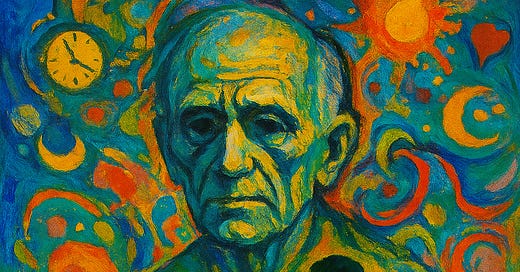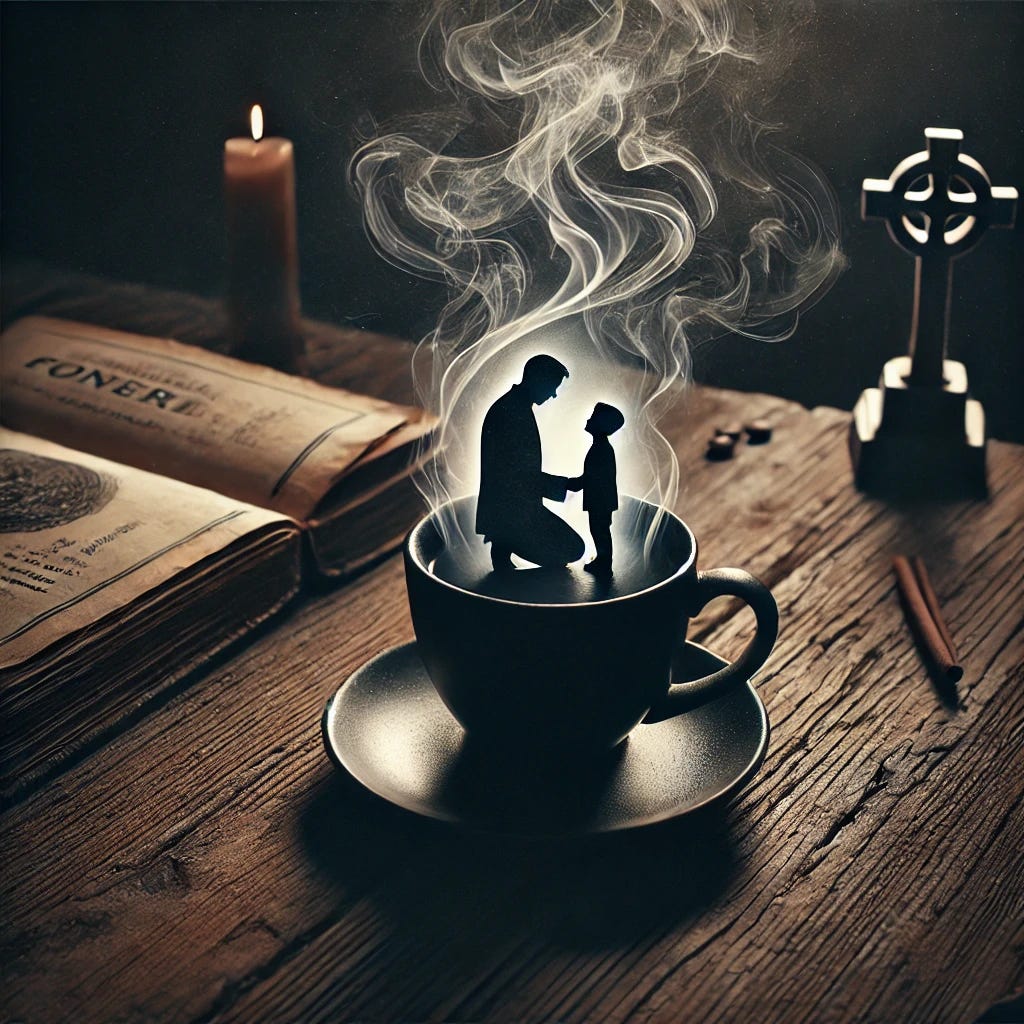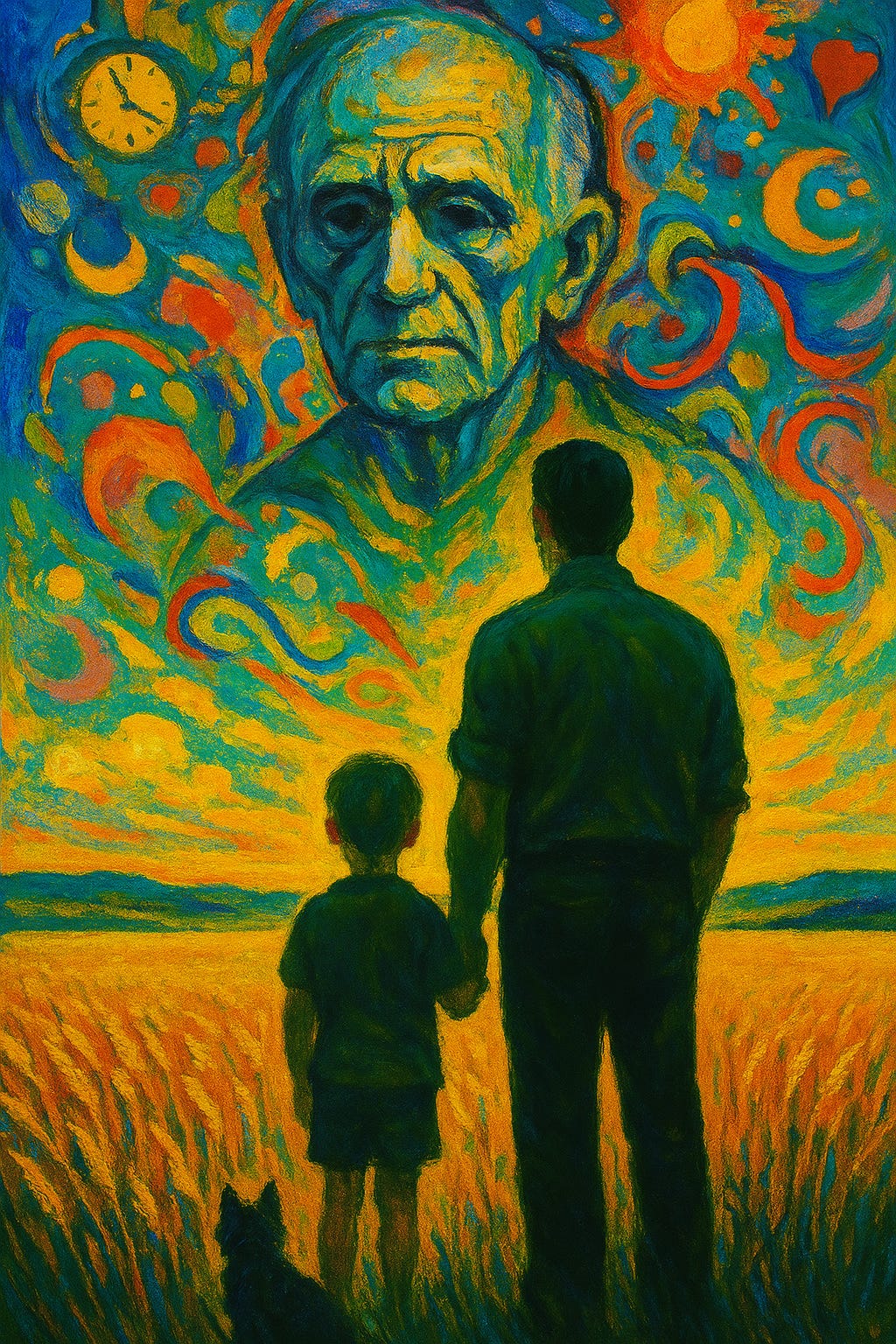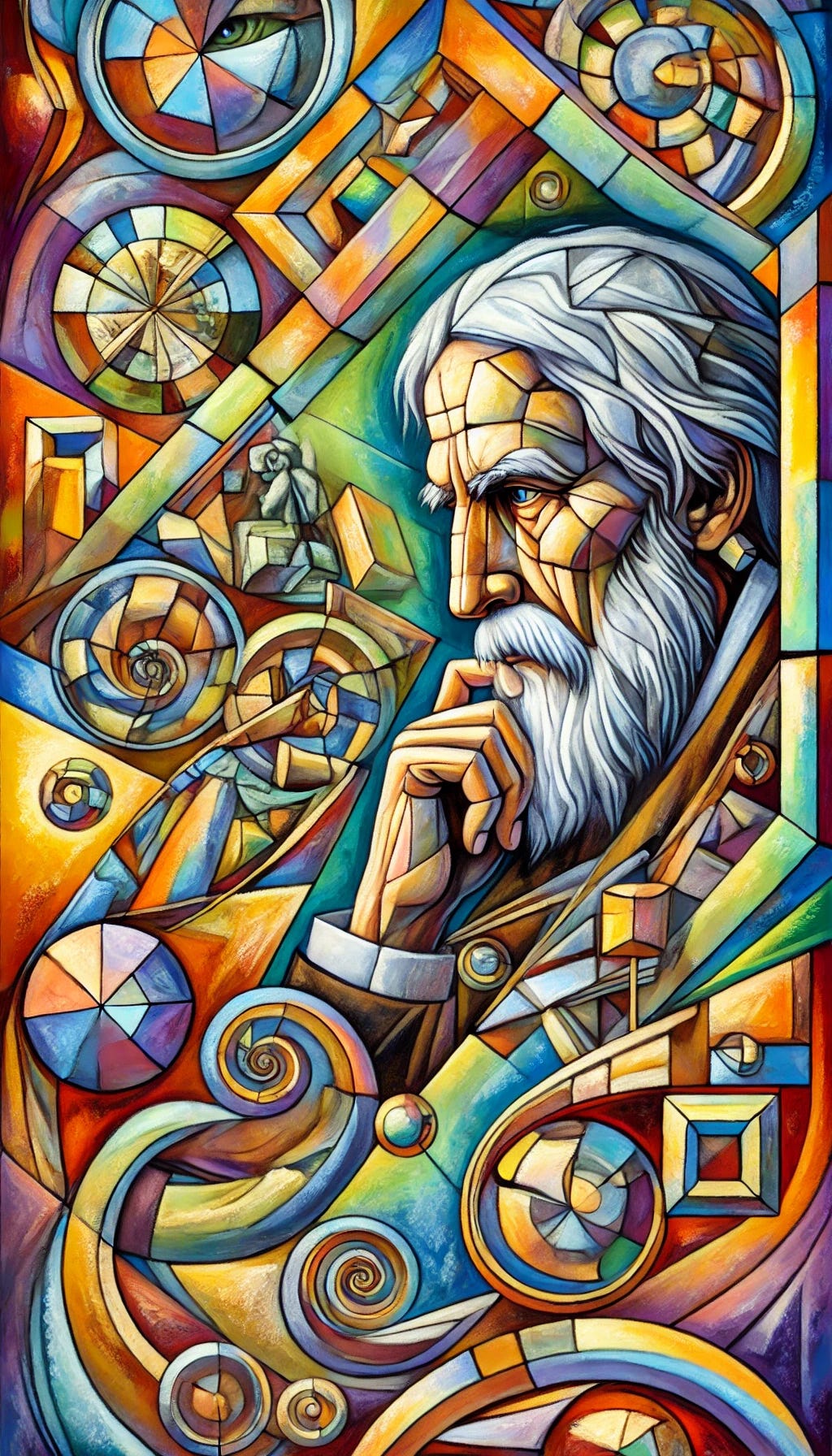Riffing on Dylan Thomas*
* (Welsh poet who wrote “Do not go gently into that good night” about his feelings surrounding his dying father) This was hard to write.
Please click on the Rage Against the Dying of the Light Orange button two centimetres above this line. These are Thomas’s lyrics, my music, not my singing, and God help us.
If you believe in the importance of free speech, subscribe to support uncensored, fearless writing—the more people who pay, the more time I can devote to this. Free speech matters. I am a university professor suspended because of a free speech issue, so I am not speaking from the bleachers. The button below takes you to that story.
Please subscribe to receive at least three pieces /essays per week with open comments. It’s $6 per month, less than USD 4. Everyone says, "Hey, it’s just a cup of coffee," but please choose my coffee when you come to the Substack counter. Cheers.
____________________________________________________________________
I was young when my mother died, and I never saw Dad cry over her, though I know it shook him. I remember the funeral; I remember Dad greeting the guests and the shitty sandwiches in the church basement; I remember heading back to school too quickly and being told by some girl that I’d woken her at 2:00 AM the night before but that she couldn’t understand me through the weeping. I guess I had blacked out; the day after offered no respite, more grief, but now it was buddying up with pals’ vomit and sweat.
My dad’s grief was a mystery. I remember telling him that he didn’t need to be Superman. Did I expect my suggestion would achieve catharsis? I only saw him emotional one time; he’d read an essay I’d written on grief, on her loss, on the fact that we weren’t a family anymore, on the feeling that everything was broken.
Dad had lost his mother two years before and his father six months before that, so only in the middle of my present grief, my guilt, and my lack of understanding of my dad’s pain can I now imagine what he must have gone through.
My sister told me that the crack hospital doctors told her that Dad had constipation. The doctor later changed her mind and said fibre wasn’t the cure. Dad had lymphoma, the quick-acting variant that never affected older people - except when it did.
Coming down the escalator to enter the baggage claim area at the Winnipeg Airport, there was still a stillborn expectation that he would be there. Except he was dying in the hospital, and there would be no aged professor father leaning against a pole, patiently waiting like all those times before.
I rented a car and drove to the hospital; standing by his bed, he was gaunt, so feeble, fighting for air. I spoke to him, I held his hand, but it couldn’t be real; there had to be a good ending.
The following morning, I sat by his bed, and at 11:30, my brother-in-law noticed that he had stopped breathing. The nurses didn’t care. My sister clutched her husband. I stepped into the hallway, and after making a few arrangements with the nurses, we got the elevator to the main floor. The exterior automatic hospital doors to the bitter Winnipeg winter opened and closed, skidding on the ice; the hospital visitors scurried in, pulling off their hoods to show red faces. I sat on a plastic chair across from the Covid guard; they were distracted, busy monitoring the use of blue paper masks.
Even when I returned to his house that night, his orange lounger was empty. It wasn’t that I wouldn’t hear his voice that evening; it was forever, and I can't imagine forever. While the house was clean and well maintained, the decor was bang on for 1975; nothing had changed since childhood.
But I am a father now, and when your parents die, it is supposed to be just a two-day fling o’ grief. Just get the funeral over and suck it up.
I went back to teach at the university after the funeral. My dad had taken the semester off when Mum died, but that was a kinder age; employers cared. A student of mine had lost her mother just a few months before, and as I stood in class, I had to turn away from her. She knew. When I complained about the utter lack of any bereavement policy at my work, the lack of even one kind word of condolences from the upper echelons of the University of Guelph/Humber administration - who had been told - they responded some weeks later with a Human Rights Complaint against me.
But how many times was I unpresentable in the work parking lot, cursing my willingness to listen to grief music, forcing myself out of the car, through the parking lot, up the sidewalk, and into my second-floor office with the narrow vertical rectangular window?
But I did my work. When you get over 45, you are not supposed to do grief for lost parents.
Everyone loses their parents at some time, but few speak of it; indeed, it is a fact of life but as popular a discussion item as diarrhoea or masturbation. All I had for relief were doors: Doors to my office. Doors to my basement man cave. Car doors.
What is getting over it? What is learning to deal with it? Why is my brain telling myself suggestions like “You should call Dad and tell him about this,” “Dad would want to read this book; you should send it to him,” “When we will be driving together across the prairies this summer, we will have to stop there . . ” or the basic “Why don’t you call Dad?”
My reflexive brain won't let him go; it keeps wanting to resurrect him, but I am getting older; he was an aged parent; I should be grateful; at least he did not suffer for months - okay, stop, when are we going to realise that “It could be worse” brings no solace. It falls down a dark rabbit hole of comparison to leave one poor, immensely Job-like, suffering soul on the earth.
No, no, in North America, we don’t grieve for our parents.
We pretend we never had parents; we throw the word “late” or “passed away” into conversations and act like it doesn’t hurt; we surprise ourselves when we can say he’s gone without pricks of grief nicking our hearts as the words pass our lips.
But I loved my dad. I want to talk about something other than the will.
Months later, as we gathered after the ash scattering, the discussion focused on the astounding cost of rental cars in vacation hot spots. I clung to my chair, waiting for the place to clear. I remembered Dad hunched over the 50-year-old electric frying pan in the kitchen, pouring Sunlight dish soap directly onto the pan. A thin slice of years of burnt eggs scraped off under a stream of warm water from tarnished faucets, the taps that sometimes coughed and sputtered when air got in the line.
It aches to think my children will go through this with me. Sophia will weep, and Vanya will stand stoically red-eyed with one tear clinging to his cheek.
I still carry my dad’s funeral program in my backpack. Foolishly, some days ago, I watched the video of his funeral. I would have rather had the flu; it wouldn’t have taken me down so hard.
Today, as I walk through a mall, I see the passionless faces of strangers. So many my age have lost their parents, and they all seem to be doing better than me.
Denial of grief is so baked in.
Outside of losing a child, is grief allowed for people my age?
Getting over it? It is not that. It is getting used to pain, not the pain going away, just the movement of our pain baseline to include more pain. And the vestiges of grief are loneliness, that wincing of the heart that is followed up by the brain telling you to get used to it.
Both parents are gone, and I have spent most of my life without my mother. I can barely pull her up in my mind’s eye, but Dad, to whom I was always closer, offers persistent memories.
But I shouldn’t egg the grief on, put those old papers under the staircase, turn the sad songs off, get up, move up and forward, press on fatherless man, play the part of the man who knows his proper role in a griefless society missing so many fathers, mothers, aged friends, pets, and all those to whom we do not owe our silence.
Or perhaps we should rage and shout into the darkness, “Where are you, Father? Where have you gone?”
“You were beloved!!”
For I do not want the memories to lose their sharp edges. Let the grief cut me; I did not want you to go, old man.










i can feel the pain as i lost my grandpaa.. i still miss him
Paul,
I'm proud of you!
What you did after your father died, it takes guts and lots of fake emotions to get up and show up to work and just act like nothing happened.
YOU DID GREAT!
You're allowed to feel. Emotions are meant to feel.
And its sad to hear that you had to go through all these.
Any human is allowed to grief whenever you're they are ready to.
Love,
Mehal
(You got me thinking that how will I manage myself after my parents death, because of course no one wants them to go away.)